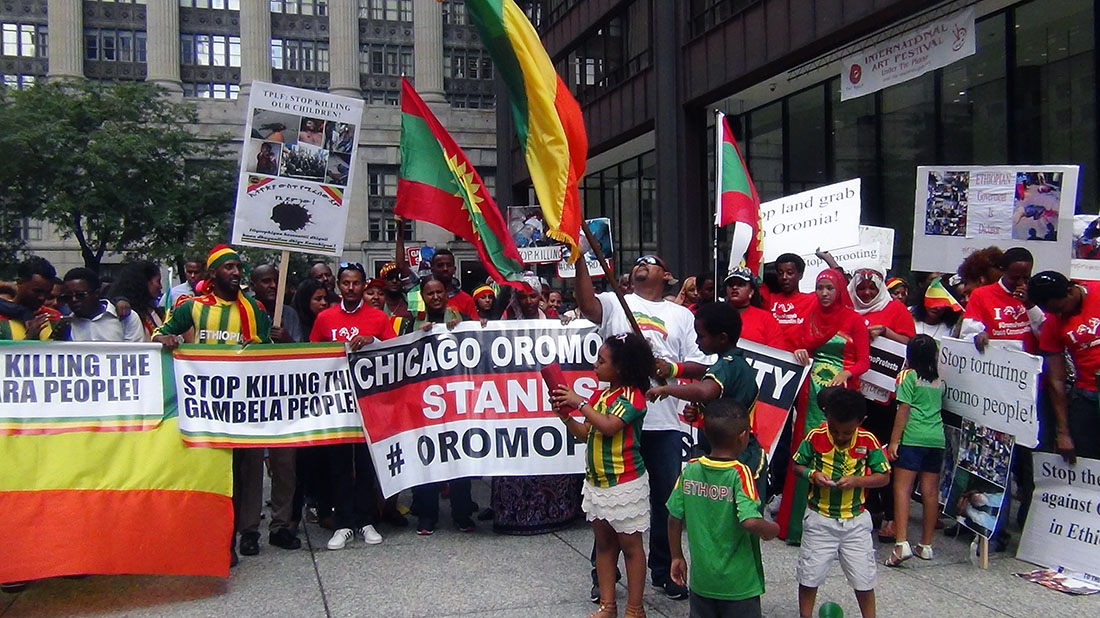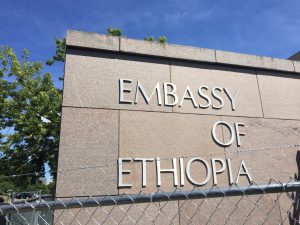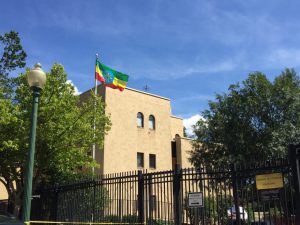WASHINGTON – Worried Ethiopian-Americans are frustrated with the mistreatment of anti-government demonstrators in their African homeland.
Protesters in the U.S. are reacting to a wave of unrest in Ethiopia amid ongoing clashes between the government and ethnic groups, including the Amhara and Oromo people.
Demonstrators in Ethiopia are demanding a halt to government oppression of various ethnic groups that they say are excluded from the country’s economic development process and subject to wrongful land seizures, among other grievances.
However, at the Ethiopian Embassy in Washington, home to the largest Ethiopian population in the United States, it was quiet this week. Medill News Service attempted to speak with an official and got as far as reaching an intercom at the front gate on a blazing hot summer day. A woman on the other end provided a phone number to reach an embassy spokesman who did not respond to a phone call, seeking comment about events in Ethiopia.
Photos above: Outside of the Embassy of Ethiopia in Washington, D.C. (Hannah Gebresilassie/Medill News Service)
The protests in Ethiopia have reverberated globally – sparking demonstrations from Chicago to Seattle and also in cities overseas including London and Johannesburg.
As many as 200 Ethiopian-Americans demonstrated Tuesday in Chicago streets, marching from Michigan Avenue to the NBC Tower.
The protesters called for the U.S. government to get involved in the dispute between anti-government forces and the regime. Demonstrators urged that the UN Human Rights Commission and foreign journalists be granted more access in Ethiopia to present an accurate picture of the civil unrest.
In Chicago, Ethiopian-Americans say they want the U.S. government to stop supporting the Ethiopian administration — and they demand new democratic leadership.
“We want this regime to go down, and we want the American people to know what the U.S. government is doing to Ethiopians,” Chicago demonstrator Abera Sisay said. “We want fairness.”
Presumably, Sisay was referring to the foreign aid that the U.S. government provides to Ethiopia.
Videos and images have surfaced of Ethiopian soldiers violently responding to protesters in Amhara and Oromia regions. The graphic imagery shows soldiers pointing guns at civilians, amid bloody bodies on the streets. Security forces are also shown allegedly roughing up civilians including children.
Human Rights Watch says more than 500 people involved in demonstrations have been killed by security forces in Ethiopia since November 2015.
“If the demonstration (in Ethiopia) becomes violent, the security people and the government have a right to protect people’s lives as well as the property of the people,” said Ethiopian Honorary Consulate General Befekadu Terefe Retta of the force used.
The lack of broad representation of Ethiopia’s ethnic groups within the government has been a source of angst among protesters.
The Tigray population comprises 6.1 percent of the entire population, yet controls the majority of the parliament in Addis Ababa. The Oromo ethnic group makes up the largest population in Ethiopia at 34.4 percent, following by the Amhara at 27 percent, according to the CIA World Factbook.
The relationship between the United States and Ethiopia dates to the early 20th Century. The two countries established diplomatic ties in 1903.
In 2015, President Barack Obama became the first sitting president to visit Ethiopia, amid nationwide protests there in response to alleged human rights violations and widespread discrimination. Many Ethiopians were disappointed with the visit.
“President Obama when he was in Addis, he declared wrongly that the government was elected democratically,” said Chicago demonstrator Desalagn Kassa. “I believe he sees the government helping him and controlling the terrorists in the Somali region.”
The U.S. State Department says America welcomes Ethiopia’s dedication to maintaining security, including through peacekeeping missions in Somalia, Sudan and South Sudan.
Alternatively, Retta said in a phone interview in Chicago that both countries benefit from the partnership. The Obama administration, he said, supports the Ethiopian government as it works to eradicate starvation, war and poverty.
“The diaspora (in the U.S.) is making it worse,” Retta said about the anti-Ethiopian government protests. “I don’t beg them, I urge them to stop this kind of nonsense and let the people (in Ethiopia) deal with their government rather than people who are here.”
Nonetheless, demonstrators in Chicago are sticking to their agenda. They encourage further demonstrations in the states and hope to see other Ethiopian-Americans raise their voices.
Photo at top: Ethiopian-Americans hold demonstration in Chicago in response to civil unrest in Oromia and Amhara regions in Ethiopia. (Zelalem Gebre/Maleda Times)
Incoming Medill graduate student Michael Gause contributed extensive on-the-scene reporting in Chicago.



